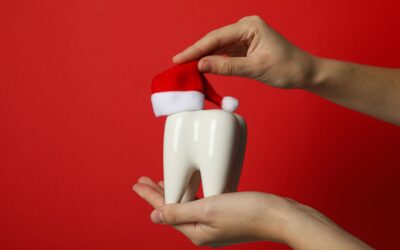As the temperatures drop and winter sets in, many people begin to notice a familiar common dental problems and discomfort—sensitive teeth. The cold can trigger sharp pain in your teeth that can make you want to curl up indoors and avoid the outdoors altogether. If you’ve ever experienced that sudden jolt of pain when breathing in cold air or eating something icy, you’re not alone. Cold weather can exacerbate tooth sensitivity, but the good news is that there are steps you can take to protect your teeth and find relief.
Let’s take a closer look at why cold weather affects sensitive teeth and explore what you can do to manage this common winter woe.
Why Do Cold Weather and Sensitive Teeth Go Hand in Hand?
Before diving into solutions, it helps to understand why cold weather can make your teeth more sensitive in the first place.
- Exposed Tooth Roots:
One of the most common causes of tooth sensitivity is receding gums. When your gums recede, the sensitive roots of your teeth are exposed. These roots don’t have the protective enamel layer that the rest of your tooth does, making them more vulnerable to temperature changes. Cold air or food can cause a sudden, sharp pain as it comes into contact with the exposed areas. - Enamel Wear and Tear:
Over time, tooth enamel naturally wears down due to factors like ageing, acidic foods, teeth grinding, or even brushing too hard. When enamel erodes, the underlying dentin (which is more sensitive to temperature) is exposed. Cold temperatures can easily affect the dentin, causing discomfort or pain when exposed to cold air or drinks. - Dental Work Sensitivity:
If you’ve had dental procedures like fillings, crowns, or teeth whitening, you may experience heightened sensitivity to temperature changes. Some dental treatments temporarily increase tooth sensitivity, which can be worsened by cold weather. - Changes in Breathing Patterns:
Cold weather often means breathing in cooler, drier air. When you inhale through your mouth (which is common in the winter), the cold air can trigger sensitivity in your teeth, especially if you already have some degree of enamel loss or gum recession.
What Can You Do to Relieve Cold-Weather Tooth Sensitivity?
The good news is that there are several things you can do to manage sensitive teeth in cold weather. Here are some tips for preventing discomfort and keeping your teeth happy this winter:
1. Switch to a Toothpaste for Sensitive Teeth
If you haven’t already, consider switching to a toothpaste formulated for sensitive teeth. These types of toothpaste contain compounds like potassium nitrate or stannous fluoride, which help to block pain signals from reaching the nerves in your teeth. Regular use can significantly reduce sensitivity over time, helping your teeth become less reactive to cold temperatures.
2. Use a Soft-Bristled Toothbrush
If you’re brushing with a hard-bristled toothbrush, it may be contributing to enamel erosion and gum recession, both of which can lead to tooth sensitivity. Switch to a soft-bristled toothbrush to ensure you’re cleaning your teeth effectively without causing further damage. Remember, brushing too aggressively can also wear down enamel, so brush gently in small, circular motions.
3. Protect Your Teeth from Extreme Cold
If your teeth are sensitive to the cold, taking steps to protect them from chilly air can help. Here are a few ideas:
- Breathe through your nose instead of your mouth when walking outside in cold weather. This will help keep the air you’re breathing warmer and less likely to trigger sensitivity.
- Wear a scarf or face mask when braving freezing temperatures. Wrapping something around your mouth can help shield your teeth from cold gusts of wind.
4. Avoid Very Hot or Cold Foods and Drinks
While it might be tempting to sip a hot coffee or eat ice cream, extreme temperatures can worsen tooth sensitivity. Try to avoid very hot or very cold foods if you notice your teeth reacting to them. If you do indulge, take small sips or bites, and allow your food to reach a moderate temperature before eating.
5. Maintain Good Oral Hygiene
Regular oral hygiene is essential for preventing the conditions that cause sensitive teeth. Brush twice a day and floss daily to keep your teeth and gums healthy. Be gentle when brushing, especially along the gum line, to avoid aggravating gum recession. Using a fluoride mouthwash can also help strengthen enamel and reduce sensitivity.
6. Use a Mouthguard if You Grind Your Teeth
Many people grind their teeth at night, especially under stress. If you’re grinding your teeth while you sleep (a condition called bruxism), it can exacerbate enamel wear and increase sensitivity. A mouthguard worn at night can help protect your teeth from the damaging effects of grinding.
7. Visit Your Dentist Regularly
If you’re experiencing persistent tooth sensitivity, it’s important to visit your dentist. A dentist can evaluate your teeth for signs of gum recession, enamel erosion, cavities, or other underlying issues that could be contributing to sensitivity. In some cases, your dentist may apply fluoride treatments, recommend desensitising treatments, or suggest protective sealants to help shield your teeth from the cold.
8. Consider Dental Bonding or Sealants
If the sensitivity is due to exposed roots or worn enamel, your dentist might recommend dental bonding or sealants. These treatments can cover the exposed areas, reducing sensitivity and protecting the teeth from further damage. This can be especially helpful if your sensitivity is severe or persistent.
Conclusion
Cold weather doesn’t have to mean enduring tooth pain every time you step outside or sip a cold drink. By taking the right precautions, you can manage your tooth sensitivity and enjoy the winter season without discomfort.
If you have any issues you want checking, then please don’t hesitate to give us a call and we will do our best to assist you.




